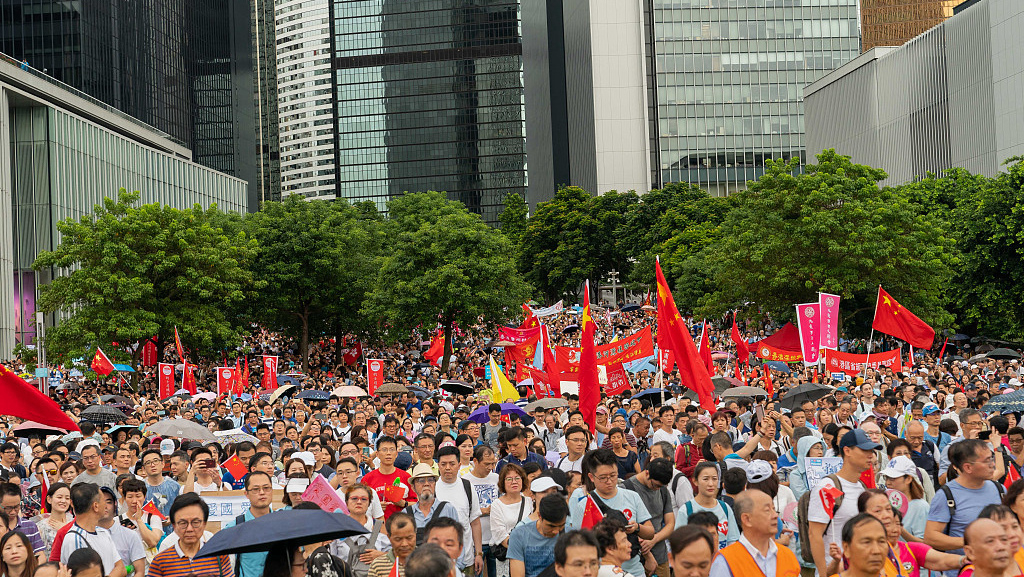

Editor's note: Danilo Türk is former President of the Republic of Slovenia from 2007 to 2012. He is currently a non-resident senior fellow at the Chongyang Institute for Financial Studies at Renmin University of China. The article reflects the author's opinion, and not necessarily the views of CGTN.
The mass rallies in Hong Kong over the past months have astonished the world - and probably the people of Hong Kong themselves. On the surface, the problems that initiated the protests are political. However, there is always a deeper reality that feeds the protests and it usually has to do with social economic questions, which define people's daily lives. In the reports covering Hong Kong more and more references are made to the questions of economic opportunities of the young, the rocketing prices of housing and other existing social and economic problems
Can protests be the way towards a solution? As witnessed in other situations of mass protest in the immediate past - such as the Occupy Wall Street in New York or the Arab Spring, both taking place in or around 2011, protest itself does not bring any solution. In the time of social media, mobilization of people can be quite easy. But the question is: what is the next? Protesters usually lack a comprehensive understanding of the complexity of policy-making or have no workable plan for change, let alone the improvement. Therefore, protests in themselves are not a solution.

Occupy Wall Street protesters wearing masks, New York City, U.S., September 17, 2013. /VCG Photo
All is relevant in any thinking about the current situation in Hong Kong. So, what could be a viable way forward? It seems that the protests have reached a stage at which a deep introspection involving all segments of the Hong Kong society is called for. As is known to all that Hong Kong has the highest level of economic freedom in the world and a large number of innovative talents. One would expect from the Hong Kong business elite more than just concerns about their own profits and the economic damage of the protests, but also visions of social improvement and development of the future.
Importantly, Hong Kong has a uniquely favorable political system for developing such a vision: the principle of the "One country, Two systems". Hong Kong is and will remain part of China. At the same time it has its own system, which has granted it a unique opportunity to develop the system in a way that would offer a good future to Hong Kong, and in return benefit the Chinese mainland as a whole.
The existing system of Hong Kong, which has evolved from its colonial legacy and over 20 years of experience as a part of China can be improved. But such improvement can come about only as a result of serious introspection and dialogues involving all segments of Hong Kong society.
A blame game is not a way forward. In addition, the rhetoric of human rights and foreign interference do not help. Foreign players will neither be able nor really willing to help in any realistic way. Violence and destruction only make things worse and dialogues more difficult to establish. Only the people of Hong Kong can decide to stop the protests and move to dialogue.
Are there any relevant models that could be looked at in a search of the much needed dialogue? Hong Kong is unique, but there are potentially relevant examples of dialogue and social improvement that work in other places.
One example is the experience of Singapore. In 2012, Singapore's Prime Minister Lee Hsien Loong initiated "Our Singapore Conversation", with the objective of creating "a home with hope and heart", led by the government and later supported by people from all walks of life. This is an interesting model that is an organized process of introspection and dialogue aims at reforms.
While it is not possible to emulate that experience elsewhere as it could serve as an inspiration to organize an in-depth introspection and dialogue needed now in Hong Kong. Useful ideas about reform and a good vision for the future can be developed as a result.
(If you want to contribute and have specific expertise, please contact us at opinions@cgtn.com)

Copyright © 2018 CGTN. Beijing ICP prepared NO.16065310-3
Copyright © 2018 CGTN. Beijing ICP prepared NO.16065310-3